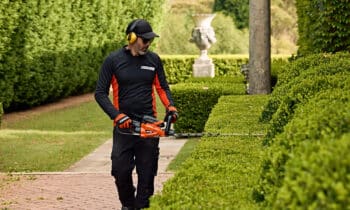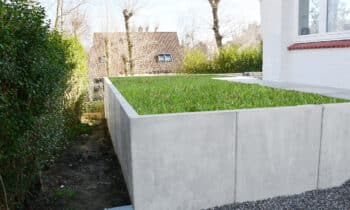
Plastic road plates prevent damage to substrate
As a garden contractor, you are supposed to beautify your customer's outdoor space. However, if you are not careful, the equipment used for this purpose, track loaders and small excavators in particular, can achieve just the opposite. Tracks in the grass, subsidence in the driveway, or mountains of churned-up earth in curves and turns...: these are unfortunate consequences, yet they can be easily avoided.
Based in Lommel, Induplates, a division of plastic specialist Indupack, has been producing and selling plastic road plates for the temporary surfacing of site roads for more than fifteen years. "Garden contractors eagerly use this solution," notes business manager Vincent Van Baelen, "primarily to protect existing surfaces. Because how often doesn't it happen that you are appointed for just some minor adjustment work somewhere in the back garden? Your customer would not appreciate it at all if you were to damage his perfectly laid turf. But road plates also give you the necessary traction. So you will maneuver easier and damage-free, and on swampy terrain there is much less risk of getting stuck."

Weight counts
Garden works are rarely of very long duration, and roadway slabs consequently remain in one place for only a few days in most cases. Moreover, they often have to be laid on relatively narrow paths or hard-to-reach places. "Weight and ergonomics are therefore important aspects in the choice of a roadway plate. After all, you want to be able to place and move them quickly and easily, without the need for extra manpower or equipment."
In that respect, plastic immediately has a big edge over the more industrial steel driving plates. "The 750 x 3,000 x 15 millimeter plastic driving plate, with a handle on two sides, a weight of 34 kilograms and a load capacity of 15 tons, is probably the most popular model in our range among garden contractors, although we also have lighter models for more limited loads. If you just find yourself with a soggy surface, you can feel free to double the same plates. That way you get extra load capacity, but the individual slabs remain manageable."

Can take a beating
A road plate that has to bear heavy traffic every day, is dragged from one location to another and spends most of its time outdoors, it had better be able to withstand some rough handling. "Wooden beams or sheet material are sometimes used instead of road plates," Van Baelen knows. "That works well for one time, but as soon as the wood gets wet, it starts to break. You don't have that risk with plastic road plates. They don't rot and are also perfectly resistant to both frost and UV rays."
Because of their flexible nature, plastic driving plates adapt nicely to the surface and loads, without leaving a permanent impression afterwards. "Eventually, the plate simply assumes its original, flat shape again. In addition, we subject each one to extensive testing at our factory, so we can confidently offer a two-year warranty against cracks and breakage. To prevent theft or discussions on site, we further give our customers the option of having their name or company name milled into the plates."

Gentle on substrate and environment
An added advantage of the flexible nature of the road plates is that they are soft even for hard surfaces. "If you lay a steel driving plate on pavements such as clinkers or cobblestones, the sharp edges can leave scratches. Rust deposits can also cause staining. Again, that's something your customer will not be served with."
Induplates' driving plates are manufactured from recycled polyethylene for 100%. "Once they have reached the end of their useful life, they themselves can be fully recycled again. In other words, no new raw materials are tapped, nor do we contribute to the ever-growing mountain of waste. On the contrary!"




